Analysis of Residential Experience and Leadership Reflection Report
VerifiedAdded on 2021/10/28
|16
|3935
|64
Report
AI Summary
This report provides a comprehensive reflection on a residential experience, analyzing the application of leadership theories and personal growth through the lens of the Gibbs reflective cycle. The student utilizes personality tests, including MBTI, GEIT, and Belbin's team roles, to evaluate their performance and identify areas for improvement in teamwork, conflict resolution, and leadership. The report details the student's feelings, actions, and observations during the residential activities, comparing them to the test results and academic evidence. The analysis reveals strengths and weaknesses in emotional intelligence, coordination, and communication, leading to a plan of action for future leadership roles. The student reflects on the importance of self-awareness, adaptability, and proactive conflict management to enhance team effectiveness and achieve desired outcomes. Finally, the report emphasizes the value of the residential experience in fostering personal and professional development.
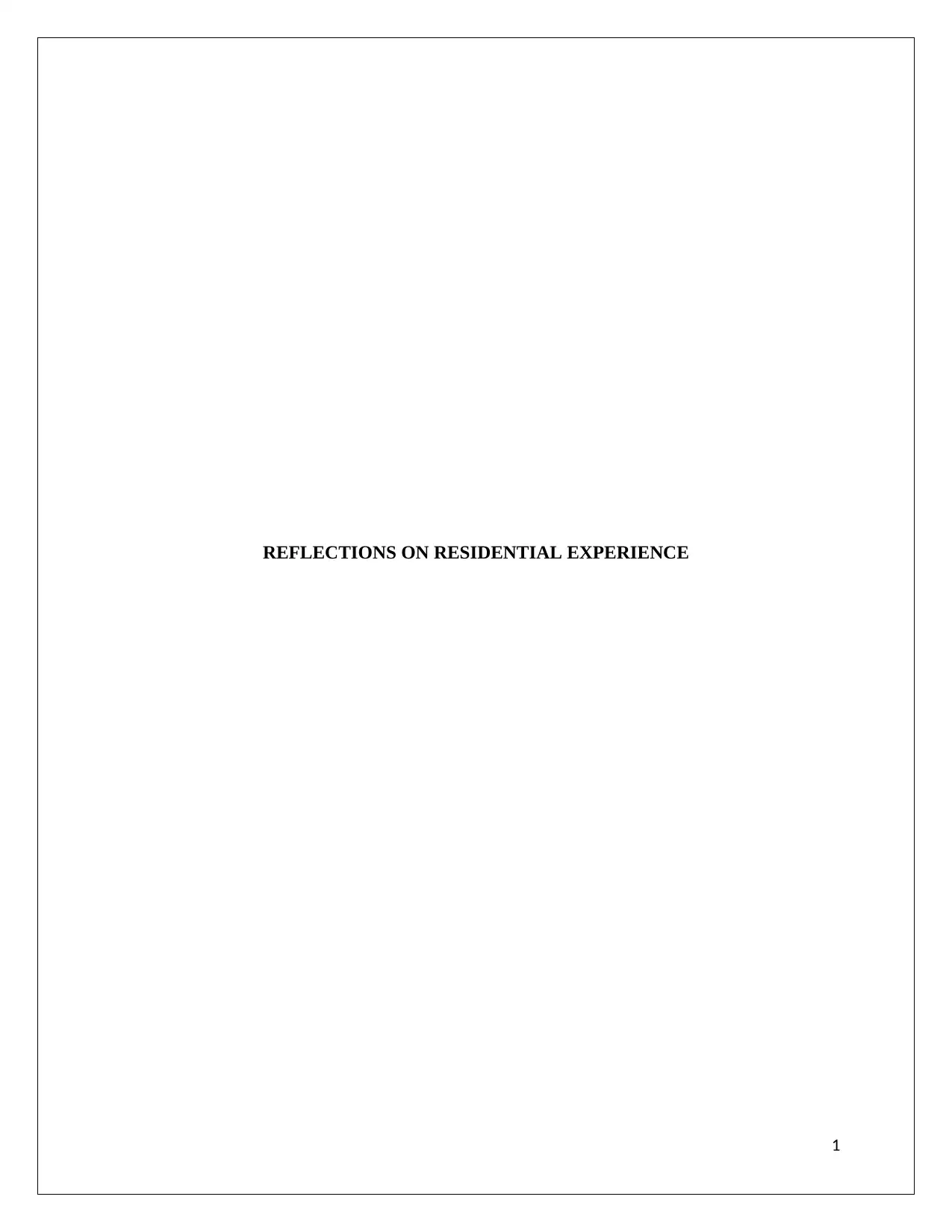
REFLECTIONS ON RESIDENTIAL EXPERIENCE
1
1
Paraphrase This Document
Need a fresh take? Get an instant paraphrase of this document with our AI Paraphraser
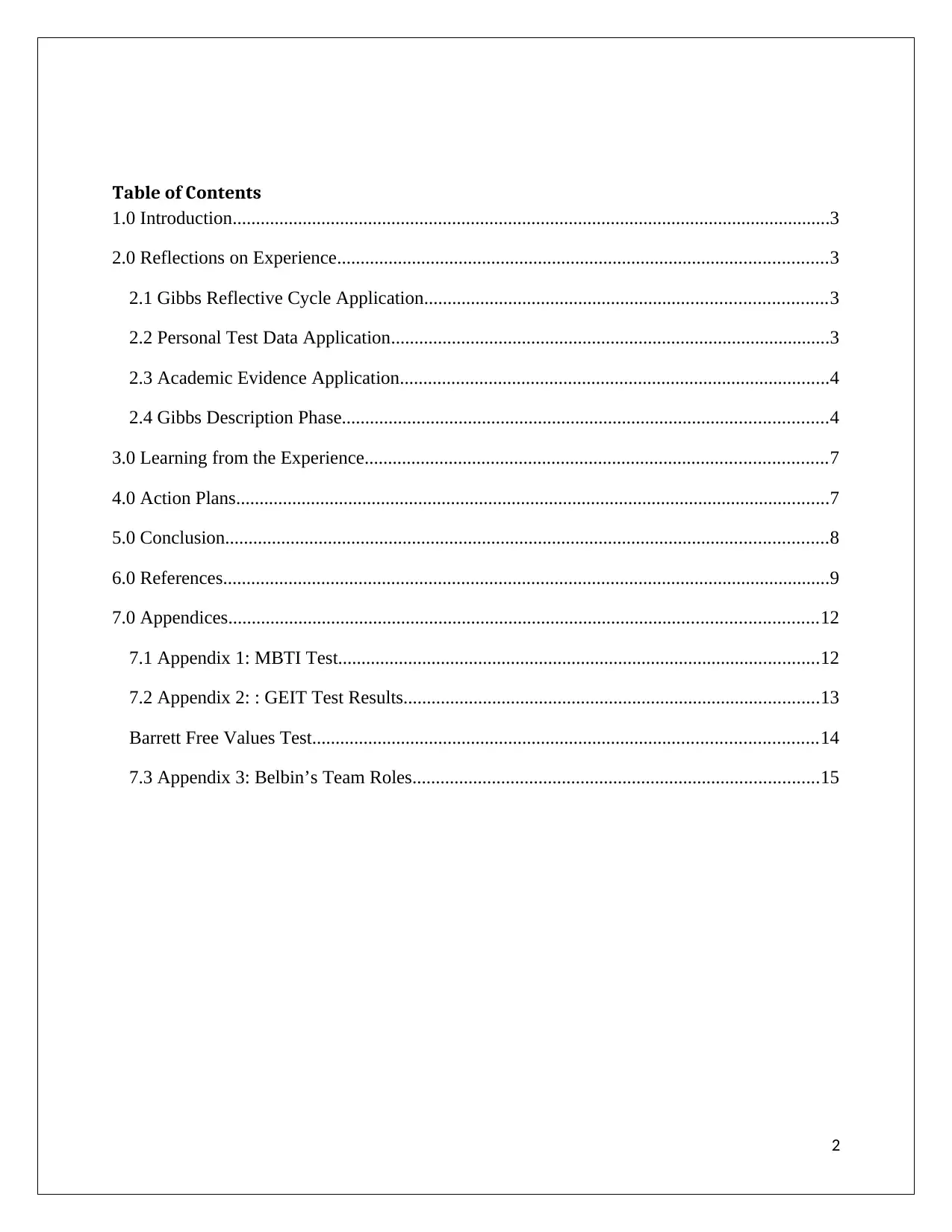
Table of Contents
1.0 Introduction................................................................................................................................3
2.0 Reflections on Experience.........................................................................................................3
2.1 Gibbs Reflective Cycle Application......................................................................................3
2.2 Personal Test Data Application..............................................................................................3
2.3 Academic Evidence Application............................................................................................4
2.4 Gibbs Description Phase........................................................................................................4
3.0 Learning from the Experience...................................................................................................7
4.0 Action Plans...............................................................................................................................7
5.0 Conclusion.................................................................................................................................8
6.0 References..................................................................................................................................9
7.0 Appendices..............................................................................................................................12
7.1 Appendix 1: MBTI Test.......................................................................................................12
7.2 Appendix 2: : GEIT Test Results.........................................................................................13
Barrett Free Values Test............................................................................................................14
7.3 Appendix 3: Belbin’s Team Roles.......................................................................................15
2
1.0 Introduction................................................................................................................................3
2.0 Reflections on Experience.........................................................................................................3
2.1 Gibbs Reflective Cycle Application......................................................................................3
2.2 Personal Test Data Application..............................................................................................3
2.3 Academic Evidence Application............................................................................................4
2.4 Gibbs Description Phase........................................................................................................4
3.0 Learning from the Experience...................................................................................................7
4.0 Action Plans...............................................................................................................................7
5.0 Conclusion.................................................................................................................................8
6.0 References..................................................................................................................................9
7.0 Appendices..............................................................................................................................12
7.1 Appendix 1: MBTI Test.......................................................................................................12
7.2 Appendix 2: : GEIT Test Results.........................................................................................13
Barrett Free Values Test............................................................................................................14
7.3 Appendix 3: Belbin’s Team Roles.......................................................................................15
2
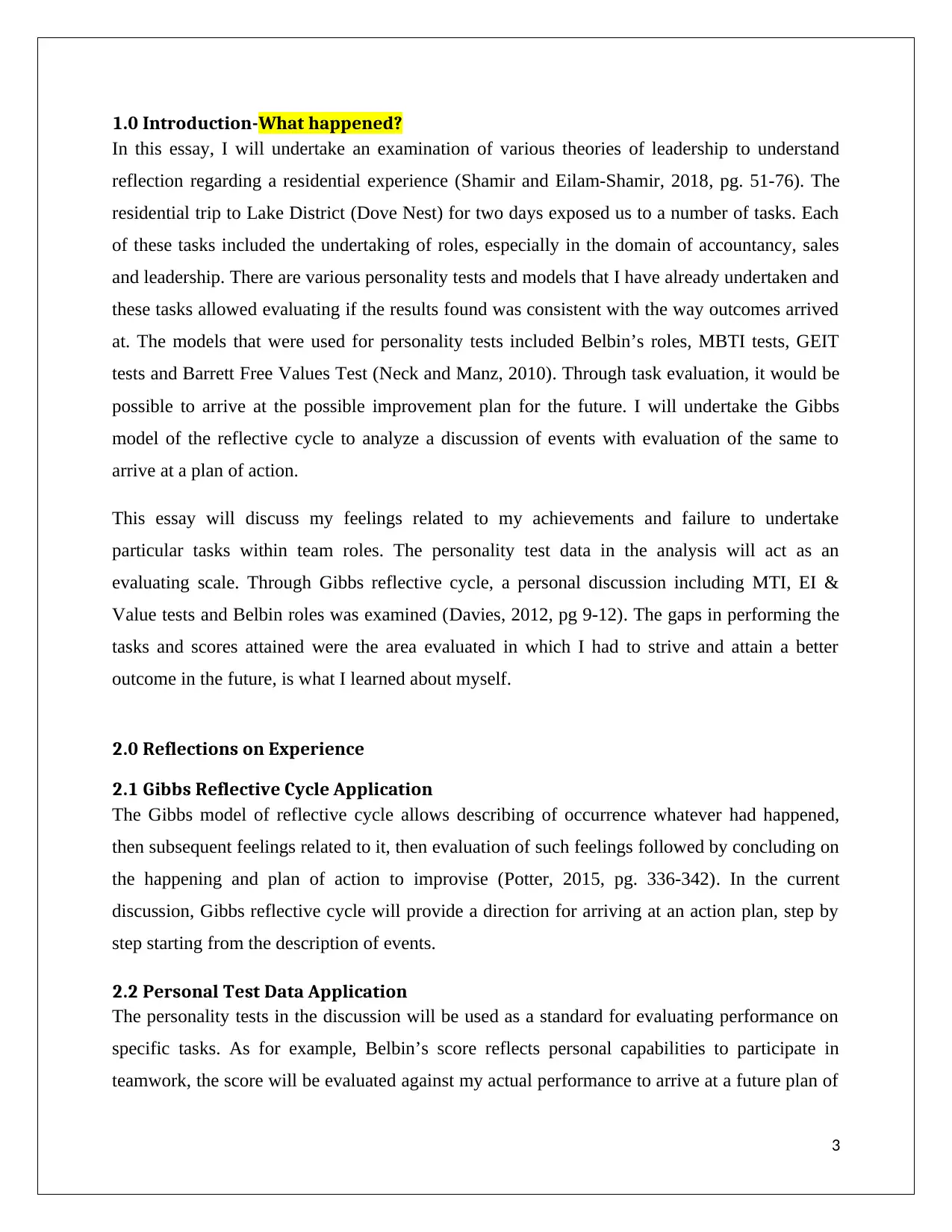
1.0 Introduction-What happened?
In this essay, I will undertake an examination of various theories of leadership to understand
reflection regarding a residential experience (Shamir and Eilam-Shamir, 2018, pg. 51-76). The
residential trip to Lake District (Dove Nest) for two days exposed us to a number of tasks. Each
of these tasks included the undertaking of roles, especially in the domain of accountancy, sales
and leadership. There are various personality tests and models that I have already undertaken and
these tasks allowed evaluating if the results found was consistent with the way outcomes arrived
at. The models that were used for personality tests included Belbin’s roles, MBTI tests, GEIT
tests and Barrett Free Values Test (Neck and Manz, 2010). Through task evaluation, it would be
possible to arrive at the possible improvement plan for the future. I will undertake the Gibbs
model of the reflective cycle to analyze a discussion of events with evaluation of the same to
arrive at a plan of action.
This essay will discuss my feelings related to my achievements and failure to undertake
particular tasks within team roles. The personality test data in the analysis will act as an
evaluating scale. Through Gibbs reflective cycle, a personal discussion including MTI, EI &
Value tests and Belbin roles was examined (Davies, 2012, pg 9-12). The gaps in performing the
tasks and scores attained were the area evaluated in which I had to strive and attain a better
outcome in the future, is what I learned about myself.
2.0 Reflections on Experience
2.1 Gibbs Reflective Cycle Application
The Gibbs model of reflective cycle allows describing of occurrence whatever had happened,
then subsequent feelings related to it, then evaluation of such feelings followed by concluding on
the happening and plan of action to improvise (Potter, 2015, pg. 336-342). In the current
discussion, Gibbs reflective cycle will provide a direction for arriving at an action plan, step by
step starting from the description of events.
2.2 Personal Test Data Application
The personality tests in the discussion will be used as a standard for evaluating performance on
specific tasks. As for example, Belbin’s score reflects personal capabilities to participate in
teamwork, the score will be evaluated against my actual performance to arrive at a future plan of
3
In this essay, I will undertake an examination of various theories of leadership to understand
reflection regarding a residential experience (Shamir and Eilam-Shamir, 2018, pg. 51-76). The
residential trip to Lake District (Dove Nest) for two days exposed us to a number of tasks. Each
of these tasks included the undertaking of roles, especially in the domain of accountancy, sales
and leadership. There are various personality tests and models that I have already undertaken and
these tasks allowed evaluating if the results found was consistent with the way outcomes arrived
at. The models that were used for personality tests included Belbin’s roles, MBTI tests, GEIT
tests and Barrett Free Values Test (Neck and Manz, 2010). Through task evaluation, it would be
possible to arrive at the possible improvement plan for the future. I will undertake the Gibbs
model of the reflective cycle to analyze a discussion of events with evaluation of the same to
arrive at a plan of action.
This essay will discuss my feelings related to my achievements and failure to undertake
particular tasks within team roles. The personality test data in the analysis will act as an
evaluating scale. Through Gibbs reflective cycle, a personal discussion including MTI, EI &
Value tests and Belbin roles was examined (Davies, 2012, pg 9-12). The gaps in performing the
tasks and scores attained were the area evaluated in which I had to strive and attain a better
outcome in the future, is what I learned about myself.
2.0 Reflections on Experience
2.1 Gibbs Reflective Cycle Application
The Gibbs model of reflective cycle allows describing of occurrence whatever had happened,
then subsequent feelings related to it, then evaluation of such feelings followed by concluding on
the happening and plan of action to improvise (Potter, 2015, pg. 336-342). In the current
discussion, Gibbs reflective cycle will provide a direction for arriving at an action plan, step by
step starting from the description of events.
2.2 Personal Test Data Application
The personality tests in the discussion will be used as a standard for evaluating performance on
specific tasks. As for example, Belbin’s score reflects personal capabilities to participate in
teamwork, the score will be evaluated against my actual performance to arrive at a future plan of
3
⊘ This is a preview!⊘
Do you want full access?
Subscribe today to unlock all pages.

Trusted by 1+ million students worldwide
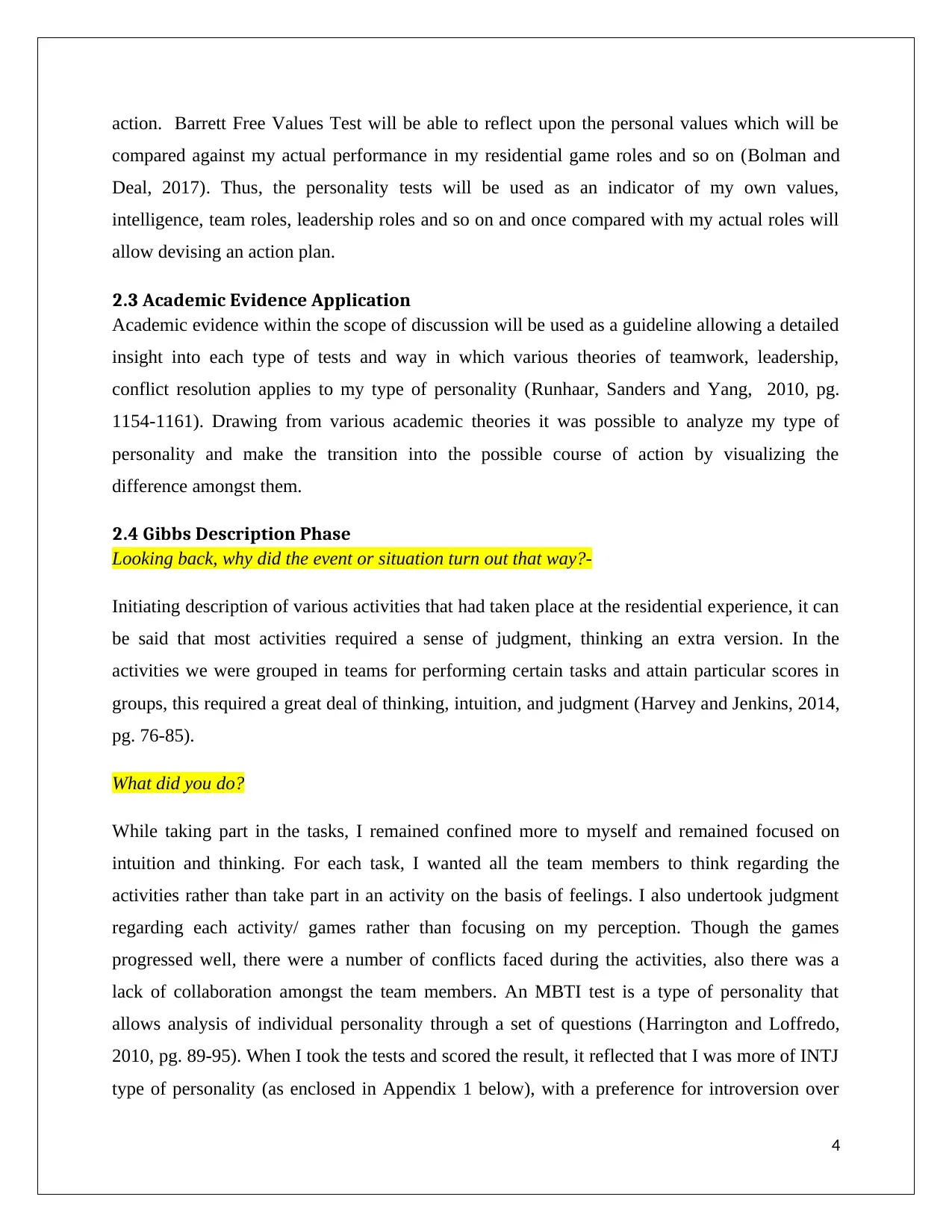
action. Barrett Free Values Test will be able to reflect upon the personal values which will be
compared against my actual performance in my residential game roles and so on (Bolman and
Deal, 2017). Thus, the personality tests will be used as an indicator of my own values,
intelligence, team roles, leadership roles and so on and once compared with my actual roles will
allow devising an action plan.
2.3 Academic Evidence Application
Academic evidence within the scope of discussion will be used as a guideline allowing a detailed
insight into each type of tests and way in which various theories of teamwork, leadership,
conflict resolution applies to my type of personality (Runhaar, Sanders and Yang, 2010, pg.
1154-1161). Drawing from various academic theories it was possible to analyze my type of
personality and make the transition into the possible course of action by visualizing the
difference amongst them.
2.4 Gibbs Description Phase
Looking back, why did the event or situation turn out that way?-
Initiating description of various activities that had taken place at the residential experience, it can
be said that most activities required a sense of judgment, thinking an extra version. In the
activities we were grouped in teams for performing certain tasks and attain particular scores in
groups, this required a great deal of thinking, intuition, and judgment (Harvey and Jenkins, 2014,
pg. 76-85).
What did you do?
While taking part in the tasks, I remained confined more to myself and remained focused on
intuition and thinking. For each task, I wanted all the team members to think regarding the
activities rather than take part in an activity on the basis of feelings. I also undertook judgment
regarding each activity/ games rather than focusing on my perception. Though the games
progressed well, there were a number of conflicts faced during the activities, also there was a
lack of collaboration amongst the team members. An MBTI test is a type of personality that
allows analysis of individual personality through a set of questions (Harrington and Loffredo,
2010, pg. 89-95). When I took the tests and scored the result, it reflected that I was more of INTJ
type of personality (as enclosed in Appendix 1 below), with a preference for introversion over
4
compared against my actual performance in my residential game roles and so on (Bolman and
Deal, 2017). Thus, the personality tests will be used as an indicator of my own values,
intelligence, team roles, leadership roles and so on and once compared with my actual roles will
allow devising an action plan.
2.3 Academic Evidence Application
Academic evidence within the scope of discussion will be used as a guideline allowing a detailed
insight into each type of tests and way in which various theories of teamwork, leadership,
conflict resolution applies to my type of personality (Runhaar, Sanders and Yang, 2010, pg.
1154-1161). Drawing from various academic theories it was possible to analyze my type of
personality and make the transition into the possible course of action by visualizing the
difference amongst them.
2.4 Gibbs Description Phase
Looking back, why did the event or situation turn out that way?-
Initiating description of various activities that had taken place at the residential experience, it can
be said that most activities required a sense of judgment, thinking an extra version. In the
activities we were grouped in teams for performing certain tasks and attain particular scores in
groups, this required a great deal of thinking, intuition, and judgment (Harvey and Jenkins, 2014,
pg. 76-85).
What did you do?
While taking part in the tasks, I remained confined more to myself and remained focused on
intuition and thinking. For each task, I wanted all the team members to think regarding the
activities rather than take part in an activity on the basis of feelings. I also undertook judgment
regarding each activity/ games rather than focusing on my perception. Though the games
progressed well, there were a number of conflicts faced during the activities, also there was a
lack of collaboration amongst the team members. An MBTI test is a type of personality that
allows analysis of individual personality through a set of questions (Harrington and Loffredo,
2010, pg. 89-95). When I took the tests and scored the result, it reflected that I was more of INTJ
type of personality (as enclosed in Appendix 1 below), with a preference for introversion over
4
Paraphrase This Document
Need a fresh take? Get an instant paraphrase of this document with our AI Paraphraser
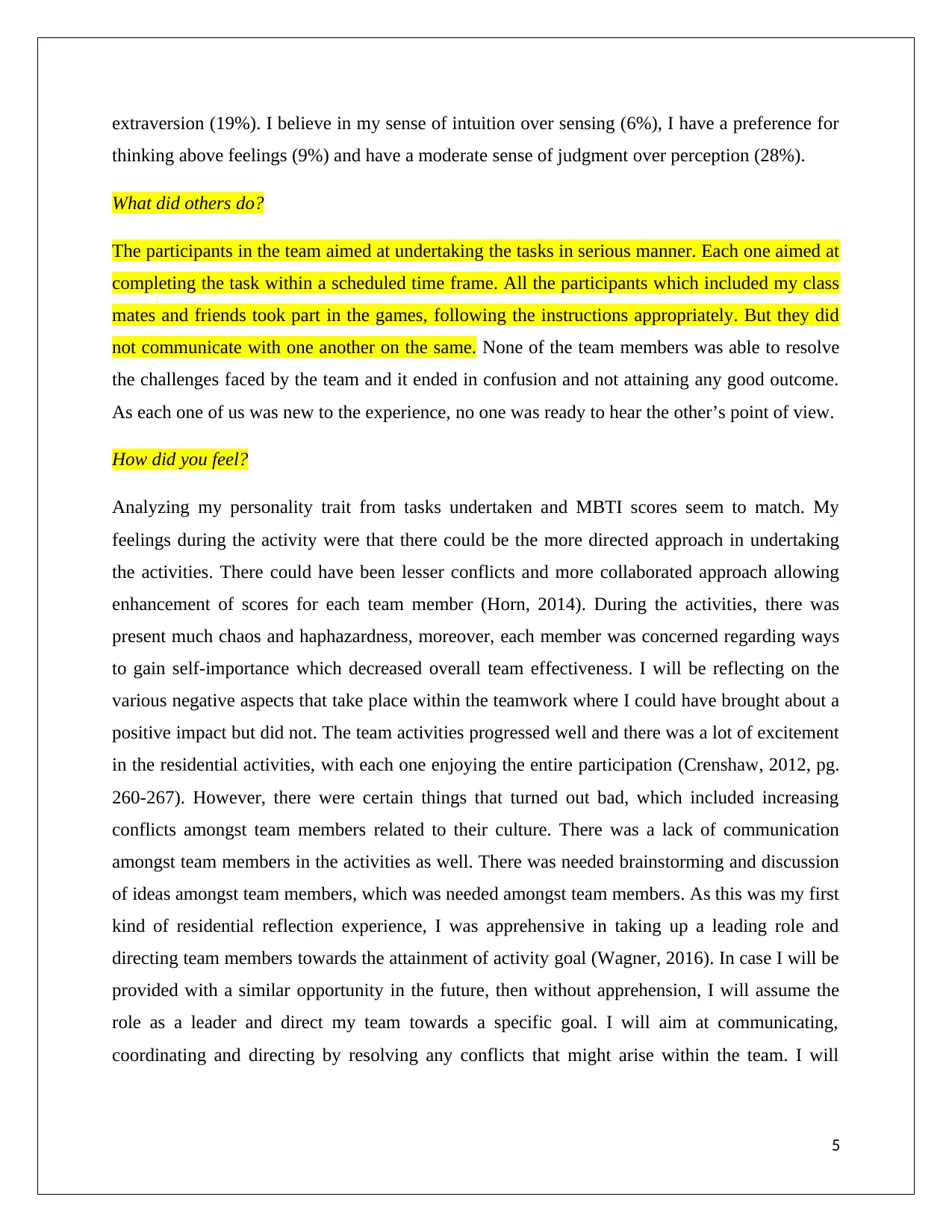
extraversion (19%). I believe in my sense of intuition over sensing (6%), I have a preference for
thinking above feelings (9%) and have a moderate sense of judgment over perception (28%).
What did others do?
The participants in the team aimed at undertaking the tasks in serious manner. Each one aimed at
completing the task within a scheduled time frame. All the participants which included my class
mates and friends took part in the games, following the instructions appropriately. But they did
not communicate with one another on the same. None of the team members was able to resolve
the challenges faced by the team and it ended in confusion and not attaining any good outcome.
As each one of us was new to the experience, no one was ready to hear the other’s point of view.
How did you feel?
Analyzing my personality trait from tasks undertaken and MBTI scores seem to match. My
feelings during the activity were that there could be the more directed approach in undertaking
the activities. There could have been lesser conflicts and more collaborated approach allowing
enhancement of scores for each team member (Horn, 2014). During the activities, there was
present much chaos and haphazardness, moreover, each member was concerned regarding ways
to gain self-importance which decreased overall team effectiveness. I will be reflecting on the
various negative aspects that take place within the teamwork where I could have brought about a
positive impact but did not. The team activities progressed well and there was a lot of excitement
in the residential activities, with each one enjoying the entire participation (Crenshaw, 2012, pg.
260-267). However, there were certain things that turned out bad, which included increasing
conflicts amongst team members related to their culture. There was a lack of communication
amongst team members in the activities as well. There was needed brainstorming and discussion
of ideas amongst team members, which was needed amongst team members. As this was my first
kind of residential reflection experience, I was apprehensive in taking up a leading role and
directing team members towards the attainment of activity goal (Wagner, 2016). In case I will be
provided with a similar opportunity in the future, then without apprehension, I will assume the
role as a leader and direct my team towards a specific goal. I will aim at communicating,
coordinating and directing by resolving any conflicts that might arise within the team. I will
5
thinking above feelings (9%) and have a moderate sense of judgment over perception (28%).
What did others do?
The participants in the team aimed at undertaking the tasks in serious manner. Each one aimed at
completing the task within a scheduled time frame. All the participants which included my class
mates and friends took part in the games, following the instructions appropriately. But they did
not communicate with one another on the same. None of the team members was able to resolve
the challenges faced by the team and it ended in confusion and not attaining any good outcome.
As each one of us was new to the experience, no one was ready to hear the other’s point of view.
How did you feel?
Analyzing my personality trait from tasks undertaken and MBTI scores seem to match. My
feelings during the activity were that there could be the more directed approach in undertaking
the activities. There could have been lesser conflicts and more collaborated approach allowing
enhancement of scores for each team member (Horn, 2014). During the activities, there was
present much chaos and haphazardness, moreover, each member was concerned regarding ways
to gain self-importance which decreased overall team effectiveness. I will be reflecting on the
various negative aspects that take place within the teamwork where I could have brought about a
positive impact but did not. The team activities progressed well and there was a lot of excitement
in the residential activities, with each one enjoying the entire participation (Crenshaw, 2012, pg.
260-267). However, there were certain things that turned out bad, which included increasing
conflicts amongst team members related to their culture. There was a lack of communication
amongst team members in the activities as well. There was needed brainstorming and discussion
of ideas amongst team members, which was needed amongst team members. As this was my first
kind of residential reflection experience, I was apprehensive in taking up a leading role and
directing team members towards the attainment of activity goal (Wagner, 2016). In case I will be
provided with a similar opportunity in the future, then without apprehension, I will assume the
role as a leader and direct my team towards a specific goal. I will aim at communicating,
coordinating and directing by resolving any conflicts that might arise within the team. I will
5
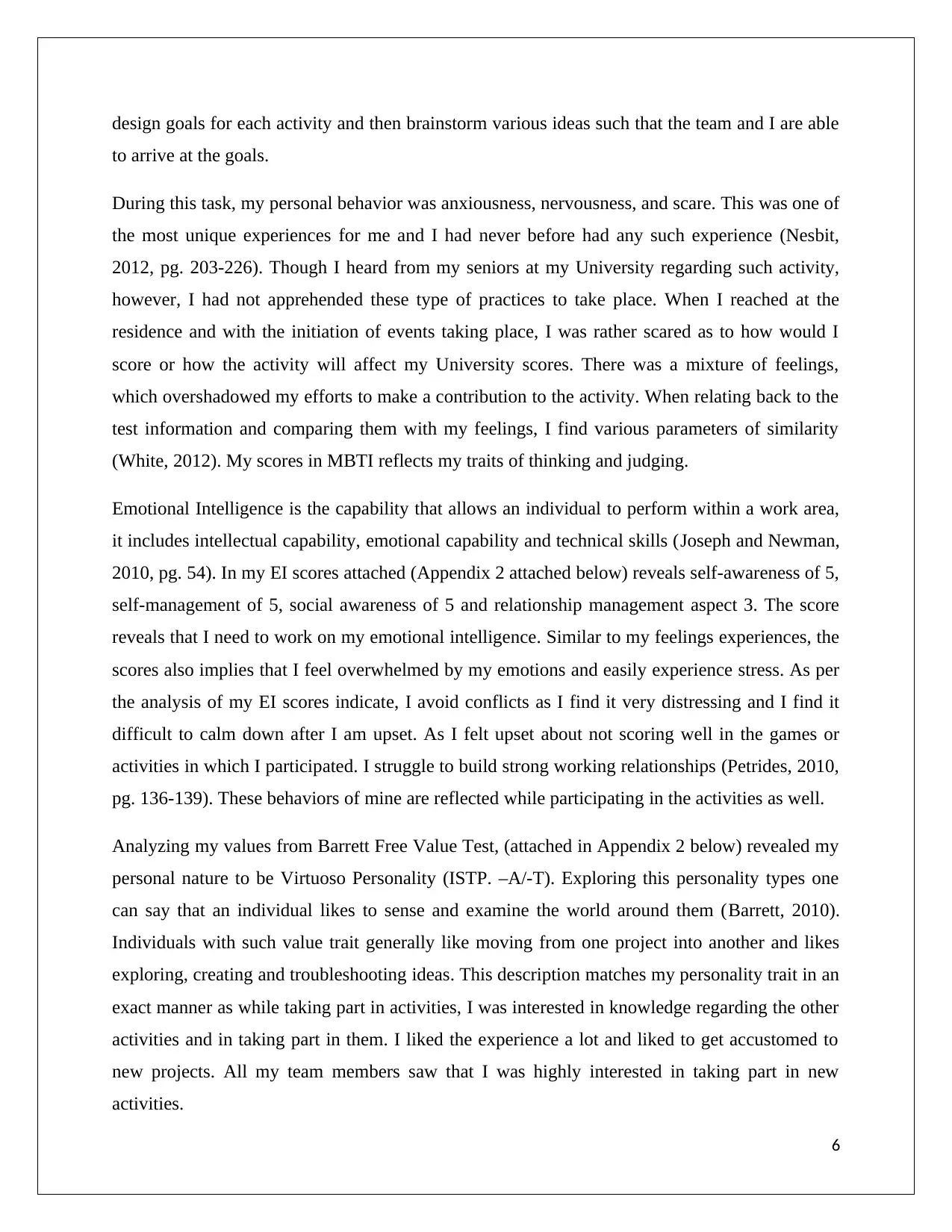
design goals for each activity and then brainstorm various ideas such that the team and I are able
to arrive at the goals.
During this task, my personal behavior was anxiousness, nervousness, and scare. This was one of
the most unique experiences for me and I had never before had any such experience (Nesbit,
2012, pg. 203-226). Though I heard from my seniors at my University regarding such activity,
however, I had not apprehended these type of practices to take place. When I reached at the
residence and with the initiation of events taking place, I was rather scared as to how would I
score or how the activity will affect my University scores. There was a mixture of feelings,
which overshadowed my efforts to make a contribution to the activity. When relating back to the
test information and comparing them with my feelings, I find various parameters of similarity
(White, 2012). My scores in MBTI reflects my traits of thinking and judging.
Emotional Intelligence is the capability that allows an individual to perform within a work area,
it includes intellectual capability, emotional capability and technical skills (Joseph and Newman,
2010, pg. 54). In my EI scores attached (Appendix 2 attached below) reveals self-awareness of 5,
self-management of 5, social awareness of 5 and relationship management aspect 3. The score
reveals that I need to work on my emotional intelligence. Similar to my feelings experiences, the
scores also implies that I feel overwhelmed by my emotions and easily experience stress. As per
the analysis of my EI scores indicate, I avoid conflicts as I find it very distressing and I find it
difficult to calm down after I am upset. As I felt upset about not scoring well in the games or
activities in which I participated. I struggle to build strong working relationships (Petrides, 2010,
pg. 136-139). These behaviors of mine are reflected while participating in the activities as well.
Analyzing my values from Barrett Free Value Test, (attached in Appendix 2 below) revealed my
personal nature to be Virtuoso Personality (ISTP. –A/-T). Exploring this personality types one
can say that an individual likes to sense and examine the world around them (Barrett, 2010).
Individuals with such value trait generally like moving from one project into another and likes
exploring, creating and troubleshooting ideas. This description matches my personality trait in an
exact manner as while taking part in activities, I was interested in knowledge regarding the other
activities and in taking part in them. I liked the experience a lot and liked to get accustomed to
new projects. All my team members saw that I was highly interested in taking part in new
activities.
6
to arrive at the goals.
During this task, my personal behavior was anxiousness, nervousness, and scare. This was one of
the most unique experiences for me and I had never before had any such experience (Nesbit,
2012, pg. 203-226). Though I heard from my seniors at my University regarding such activity,
however, I had not apprehended these type of practices to take place. When I reached at the
residence and with the initiation of events taking place, I was rather scared as to how would I
score or how the activity will affect my University scores. There was a mixture of feelings,
which overshadowed my efforts to make a contribution to the activity. When relating back to the
test information and comparing them with my feelings, I find various parameters of similarity
(White, 2012). My scores in MBTI reflects my traits of thinking and judging.
Emotional Intelligence is the capability that allows an individual to perform within a work area,
it includes intellectual capability, emotional capability and technical skills (Joseph and Newman,
2010, pg. 54). In my EI scores attached (Appendix 2 attached below) reveals self-awareness of 5,
self-management of 5, social awareness of 5 and relationship management aspect 3. The score
reveals that I need to work on my emotional intelligence. Similar to my feelings experiences, the
scores also implies that I feel overwhelmed by my emotions and easily experience stress. As per
the analysis of my EI scores indicate, I avoid conflicts as I find it very distressing and I find it
difficult to calm down after I am upset. As I felt upset about not scoring well in the games or
activities in which I participated. I struggle to build strong working relationships (Petrides, 2010,
pg. 136-139). These behaviors of mine are reflected while participating in the activities as well.
Analyzing my values from Barrett Free Value Test, (attached in Appendix 2 below) revealed my
personal nature to be Virtuoso Personality (ISTP. –A/-T). Exploring this personality types one
can say that an individual likes to sense and examine the world around them (Barrett, 2010).
Individuals with such value trait generally like moving from one project into another and likes
exploring, creating and troubleshooting ideas. This description matches my personality trait in an
exact manner as while taking part in activities, I was interested in knowledge regarding the other
activities and in taking part in them. I liked the experience a lot and liked to get accustomed to
new projects. All my team members saw that I was highly interested in taking part in new
activities.
6
⊘ This is a preview!⊘
Do you want full access?
Subscribe today to unlock all pages.

Trusted by 1+ million students worldwide
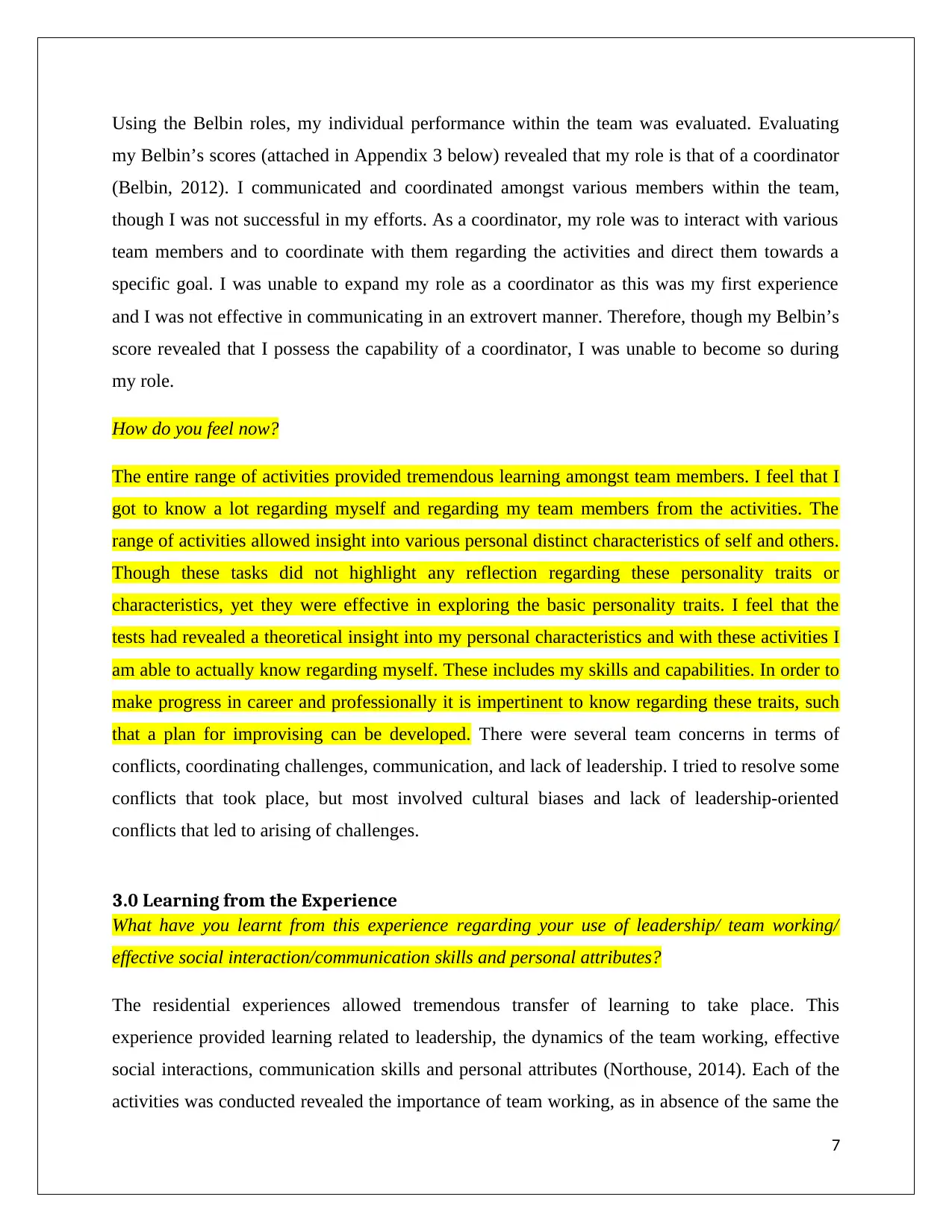
Using the Belbin roles, my individual performance within the team was evaluated. Evaluating
my Belbin’s scores (attached in Appendix 3 below) revealed that my role is that of a coordinator
(Belbin, 2012). I communicated and coordinated amongst various members within the team,
though I was not successful in my efforts. As a coordinator, my role was to interact with various
team members and to coordinate with them regarding the activities and direct them towards a
specific goal. I was unable to expand my role as a coordinator as this was my first experience
and I was not effective in communicating in an extrovert manner. Therefore, though my Belbin’s
score revealed that I possess the capability of a coordinator, I was unable to become so during
my role.
How do you feel now?
The entire range of activities provided tremendous learning amongst team members. I feel that I
got to know a lot regarding myself and regarding my team members from the activities. The
range of activities allowed insight into various personal distinct characteristics of self and others.
Though these tasks did not highlight any reflection regarding these personality traits or
characteristics, yet they were effective in exploring the basic personality traits. I feel that the
tests had revealed a theoretical insight into my personal characteristics and with these activities I
am able to actually know regarding myself. These includes my skills and capabilities. In order to
make progress in career and professionally it is impertinent to know regarding these traits, such
that a plan for improvising can be developed. There were several team concerns in terms of
conflicts, coordinating challenges, communication, and lack of leadership. I tried to resolve some
conflicts that took place, but most involved cultural biases and lack of leadership-oriented
conflicts that led to arising of challenges.
3.0 Learning from the Experience
What have you learnt from this experience regarding your use of leadership/ team working/
effective social interaction/communication skills and personal attributes?
The residential experiences allowed tremendous transfer of learning to take place. This
experience provided learning related to leadership, the dynamics of the team working, effective
social interactions, communication skills and personal attributes (Northouse, 2014). Each of the
activities was conducted revealed the importance of team working, as in absence of the same the
7
my Belbin’s scores (attached in Appendix 3 below) revealed that my role is that of a coordinator
(Belbin, 2012). I communicated and coordinated amongst various members within the team,
though I was not successful in my efforts. As a coordinator, my role was to interact with various
team members and to coordinate with them regarding the activities and direct them towards a
specific goal. I was unable to expand my role as a coordinator as this was my first experience
and I was not effective in communicating in an extrovert manner. Therefore, though my Belbin’s
score revealed that I possess the capability of a coordinator, I was unable to become so during
my role.
How do you feel now?
The entire range of activities provided tremendous learning amongst team members. I feel that I
got to know a lot regarding myself and regarding my team members from the activities. The
range of activities allowed insight into various personal distinct characteristics of self and others.
Though these tasks did not highlight any reflection regarding these personality traits or
characteristics, yet they were effective in exploring the basic personality traits. I feel that the
tests had revealed a theoretical insight into my personal characteristics and with these activities I
am able to actually know regarding myself. These includes my skills and capabilities. In order to
make progress in career and professionally it is impertinent to know regarding these traits, such
that a plan for improvising can be developed. There were several team concerns in terms of
conflicts, coordinating challenges, communication, and lack of leadership. I tried to resolve some
conflicts that took place, but most involved cultural biases and lack of leadership-oriented
conflicts that led to arising of challenges.
3.0 Learning from the Experience
What have you learnt from this experience regarding your use of leadership/ team working/
effective social interaction/communication skills and personal attributes?
The residential experiences allowed tremendous transfer of learning to take place. This
experience provided learning related to leadership, the dynamics of the team working, effective
social interactions, communication skills and personal attributes (Northouse, 2014). Each of the
activities was conducted revealed the importance of team working, as in absence of the same the
7
Paraphrase This Document
Need a fresh take? Get an instant paraphrase of this document with our AI Paraphraser
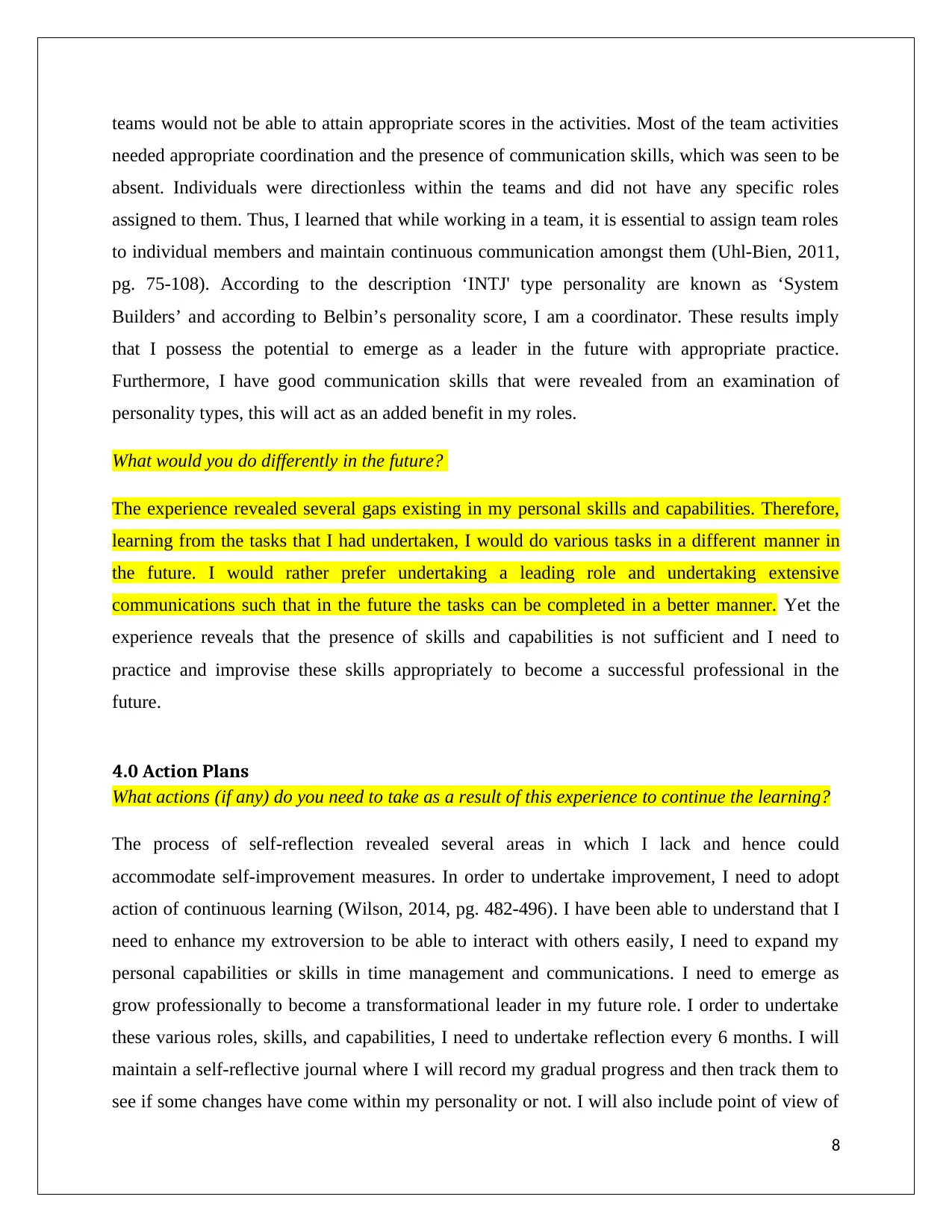
teams would not be able to attain appropriate scores in the activities. Most of the team activities
needed appropriate coordination and the presence of communication skills, which was seen to be
absent. Individuals were directionless within the teams and did not have any specific roles
assigned to them. Thus, I learned that while working in a team, it is essential to assign team roles
to individual members and maintain continuous communication amongst them (Uhl-Bien, 2011,
pg. 75-108). According to the description ‘INTJ' type personality are known as ‘System
Builders’ and according to Belbin’s personality score, I am a coordinator. These results imply
that I possess the potential to emerge as a leader in the future with appropriate practice.
Furthermore, I have good communication skills that were revealed from an examination of
personality types, this will act as an added benefit in my roles.
What would you do differently in the future?
The experience revealed several gaps existing in my personal skills and capabilities. Therefore,
learning from the tasks that I had undertaken, I would do various tasks in a different manner in
the future. I would rather prefer undertaking a leading role and undertaking extensive
communications such that in the future the tasks can be completed in a better manner. Yet the
experience reveals that the presence of skills and capabilities is not sufficient and I need to
practice and improvise these skills appropriately to become a successful professional in the
future.
4.0 Action Plans
What actions (if any) do you need to take as a result of this experience to continue the learning?
The process of self-reflection revealed several areas in which I lack and hence could
accommodate self-improvement measures. In order to undertake improvement, I need to adopt
action of continuous learning (Wilson, 2014, pg. 482-496). I have been able to understand that I
need to enhance my extroversion to be able to interact with others easily, I need to expand my
personal capabilities or skills in time management and communications. I need to emerge as
grow professionally to become a transformational leader in my future role. I order to undertake
these various roles, skills, and capabilities, I need to undertake reflection every 6 months. I will
maintain a self-reflective journal where I will record my gradual progress and then track them to
see if some changes have come within my personality or not. I will also include point of view of
8
needed appropriate coordination and the presence of communication skills, which was seen to be
absent. Individuals were directionless within the teams and did not have any specific roles
assigned to them. Thus, I learned that while working in a team, it is essential to assign team roles
to individual members and maintain continuous communication amongst them (Uhl-Bien, 2011,
pg. 75-108). According to the description ‘INTJ' type personality are known as ‘System
Builders’ and according to Belbin’s personality score, I am a coordinator. These results imply
that I possess the potential to emerge as a leader in the future with appropriate practice.
Furthermore, I have good communication skills that were revealed from an examination of
personality types, this will act as an added benefit in my roles.
What would you do differently in the future?
The experience revealed several gaps existing in my personal skills and capabilities. Therefore,
learning from the tasks that I had undertaken, I would do various tasks in a different manner in
the future. I would rather prefer undertaking a leading role and undertaking extensive
communications such that in the future the tasks can be completed in a better manner. Yet the
experience reveals that the presence of skills and capabilities is not sufficient and I need to
practice and improvise these skills appropriately to become a successful professional in the
future.
4.0 Action Plans
What actions (if any) do you need to take as a result of this experience to continue the learning?
The process of self-reflection revealed several areas in which I lack and hence could
accommodate self-improvement measures. In order to undertake improvement, I need to adopt
action of continuous learning (Wilson, 2014, pg. 482-496). I have been able to understand that I
need to enhance my extroversion to be able to interact with others easily, I need to expand my
personal capabilities or skills in time management and communications. I need to emerge as
grow professionally to become a transformational leader in my future role. I order to undertake
these various roles, skills, and capabilities, I need to undertake reflection every 6 months. I will
maintain a self-reflective journal where I will record my gradual progress and then track them to
see if some changes have come within my personality or not. I will also include point of view of
8
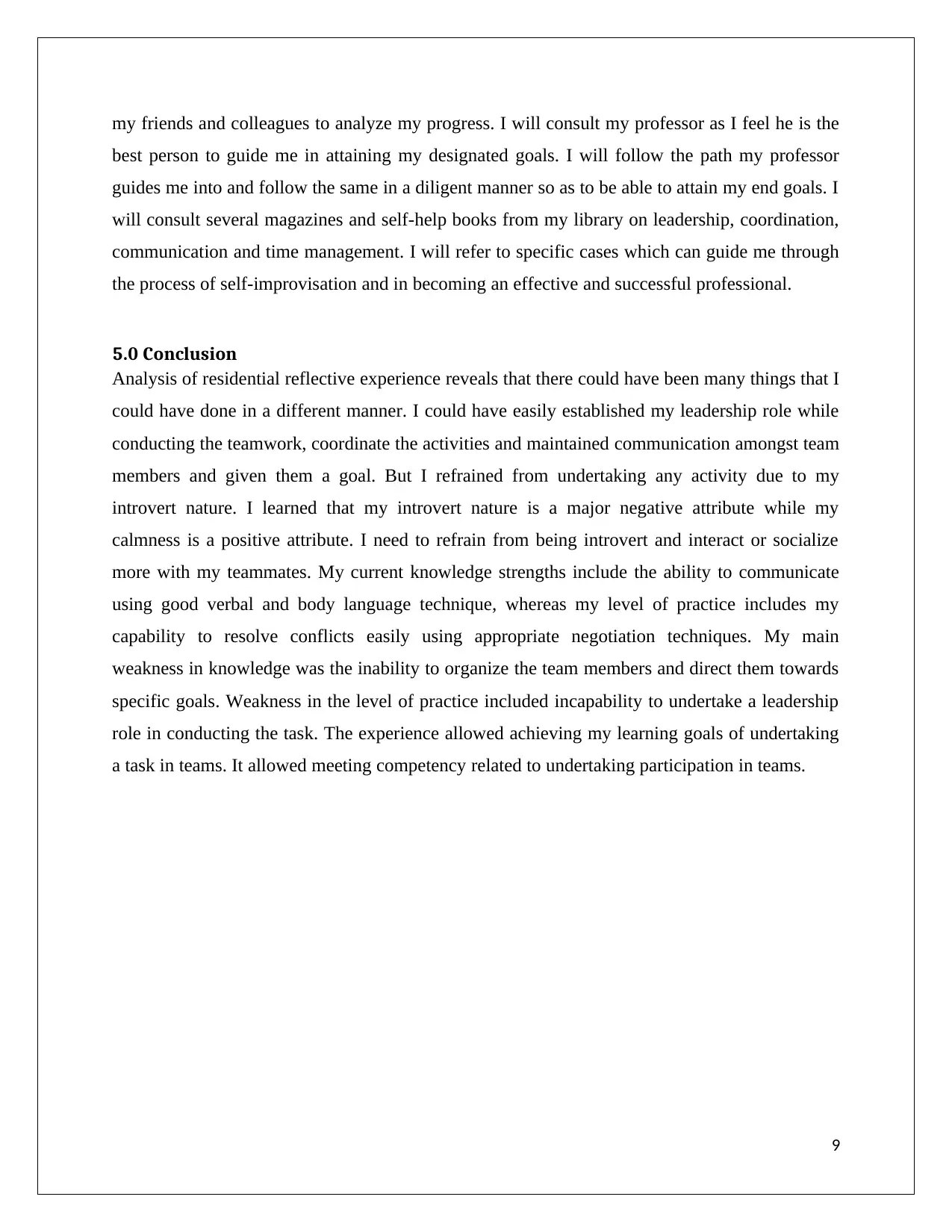
my friends and colleagues to analyze my progress. I will consult my professor as I feel he is the
best person to guide me in attaining my designated goals. I will follow the path my professor
guides me into and follow the same in a diligent manner so as to be able to attain my end goals. I
will consult several magazines and self-help books from my library on leadership, coordination,
communication and time management. I will refer to specific cases which can guide me through
the process of self-improvisation and in becoming an effective and successful professional.
5.0 Conclusion
Analysis of residential reflective experience reveals that there could have been many things that I
could have done in a different manner. I could have easily established my leadership role while
conducting the teamwork, coordinate the activities and maintained communication amongst team
members and given them a goal. But I refrained from undertaking any activity due to my
introvert nature. I learned that my introvert nature is a major negative attribute while my
calmness is a positive attribute. I need to refrain from being introvert and interact or socialize
more with my teammates. My current knowledge strengths include the ability to communicate
using good verbal and body language technique, whereas my level of practice includes my
capability to resolve conflicts easily using appropriate negotiation techniques. My main
weakness in knowledge was the inability to organize the team members and direct them towards
specific goals. Weakness in the level of practice included incapability to undertake a leadership
role in conducting the task. The experience allowed achieving my learning goals of undertaking
a task in teams. It allowed meeting competency related to undertaking participation in teams.
9
best person to guide me in attaining my designated goals. I will follow the path my professor
guides me into and follow the same in a diligent manner so as to be able to attain my end goals. I
will consult several magazines and self-help books from my library on leadership, coordination,
communication and time management. I will refer to specific cases which can guide me through
the process of self-improvisation and in becoming an effective and successful professional.
5.0 Conclusion
Analysis of residential reflective experience reveals that there could have been many things that I
could have done in a different manner. I could have easily established my leadership role while
conducting the teamwork, coordinate the activities and maintained communication amongst team
members and given them a goal. But I refrained from undertaking any activity due to my
introvert nature. I learned that my introvert nature is a major negative attribute while my
calmness is a positive attribute. I need to refrain from being introvert and interact or socialize
more with my teammates. My current knowledge strengths include the ability to communicate
using good verbal and body language technique, whereas my level of practice includes my
capability to resolve conflicts easily using appropriate negotiation techniques. My main
weakness in knowledge was the inability to organize the team members and direct them towards
specific goals. Weakness in the level of practice included incapability to undertake a leadership
role in conducting the task. The experience allowed achieving my learning goals of undertaking
a task in teams. It allowed meeting competency related to undertaking participation in teams.
9
⊘ This is a preview!⊘
Do you want full access?
Subscribe today to unlock all pages.

Trusted by 1+ million students worldwide
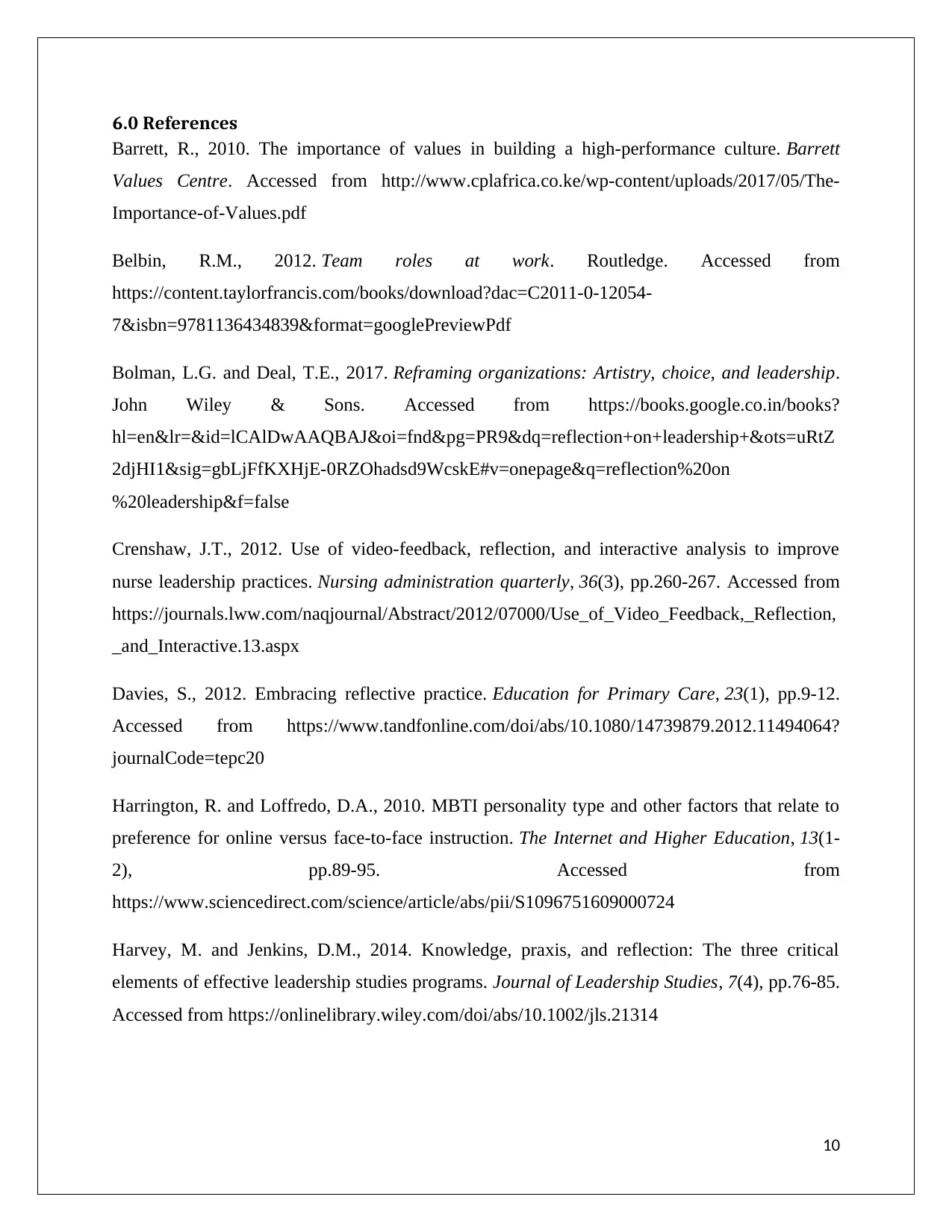
6.0 References
Barrett, R., 2010. The importance of values in building a high-performance culture. Barrett
Values Centre. Accessed from http://www.cplafrica.co.ke/wp-content/uploads/2017/05/The-
Importance-of-Values.pdf
Belbin, R.M., 2012. Team roles at work. Routledge. Accessed from
https://content.taylorfrancis.com/books/download?dac=C2011-0-12054-
7&isbn=9781136434839&format=googlePreviewPdf
Bolman, L.G. and Deal, T.E., 2017. Reframing organizations: Artistry, choice, and leadership.
John Wiley & Sons. Accessed from https://books.google.co.in/books?
hl=en&lr=&id=lCAlDwAAQBAJ&oi=fnd&pg=PR9&dq=reflection+on+leadership+&ots=uRtZ
2djHI1&sig=gbLjFfKXHjE-0RZOhadsd9WcskE#v=onepage&q=reflection%20on
%20leadership&f=false
Crenshaw, J.T., 2012. Use of video-feedback, reflection, and interactive analysis to improve
nurse leadership practices. Nursing administration quarterly, 36(3), pp.260-267. Accessed from
https://journals.lww.com/naqjournal/Abstract/2012/07000/Use_of_Video_Feedback,_Reflection,
_and_Interactive.13.aspx
Davies, S., 2012. Embracing reflective practice. Education for Primary Care, 23(1), pp.9-12.
Accessed from https://www.tandfonline.com/doi/abs/10.1080/14739879.2012.11494064?
journalCode=tepc20
Harrington, R. and Loffredo, D.A., 2010. MBTI personality type and other factors that relate to
preference for online versus face-to-face instruction. The Internet and Higher Education, 13(1-
2), pp.89-95. Accessed from
https://www.sciencedirect.com/science/article/abs/pii/S1096751609000724
Harvey, M. and Jenkins, D.M., 2014. Knowledge, praxis, and reflection: The three critical
elements of effective leadership studies programs. Journal of Leadership Studies, 7(4), pp.76-85.
Accessed from https://onlinelibrary.wiley.com/doi/abs/10.1002/jls.21314
10
Barrett, R., 2010. The importance of values in building a high-performance culture. Barrett
Values Centre. Accessed from http://www.cplafrica.co.ke/wp-content/uploads/2017/05/The-
Importance-of-Values.pdf
Belbin, R.M., 2012. Team roles at work. Routledge. Accessed from
https://content.taylorfrancis.com/books/download?dac=C2011-0-12054-
7&isbn=9781136434839&format=googlePreviewPdf
Bolman, L.G. and Deal, T.E., 2017. Reframing organizations: Artistry, choice, and leadership.
John Wiley & Sons. Accessed from https://books.google.co.in/books?
hl=en&lr=&id=lCAlDwAAQBAJ&oi=fnd&pg=PR9&dq=reflection+on+leadership+&ots=uRtZ
2djHI1&sig=gbLjFfKXHjE-0RZOhadsd9WcskE#v=onepage&q=reflection%20on
%20leadership&f=false
Crenshaw, J.T., 2012. Use of video-feedback, reflection, and interactive analysis to improve
nurse leadership practices. Nursing administration quarterly, 36(3), pp.260-267. Accessed from
https://journals.lww.com/naqjournal/Abstract/2012/07000/Use_of_Video_Feedback,_Reflection,
_and_Interactive.13.aspx
Davies, S., 2012. Embracing reflective practice. Education for Primary Care, 23(1), pp.9-12.
Accessed from https://www.tandfonline.com/doi/abs/10.1080/14739879.2012.11494064?
journalCode=tepc20
Harrington, R. and Loffredo, D.A., 2010. MBTI personality type and other factors that relate to
preference for online versus face-to-face instruction. The Internet and Higher Education, 13(1-
2), pp.89-95. Accessed from
https://www.sciencedirect.com/science/article/abs/pii/S1096751609000724
Harvey, M. and Jenkins, D.M., 2014. Knowledge, praxis, and reflection: The three critical
elements of effective leadership studies programs. Journal of Leadership Studies, 7(4), pp.76-85.
Accessed from https://onlinelibrary.wiley.com/doi/abs/10.1002/jls.21314
10
Paraphrase This Document
Need a fresh take? Get an instant paraphrase of this document with our AI Paraphraser
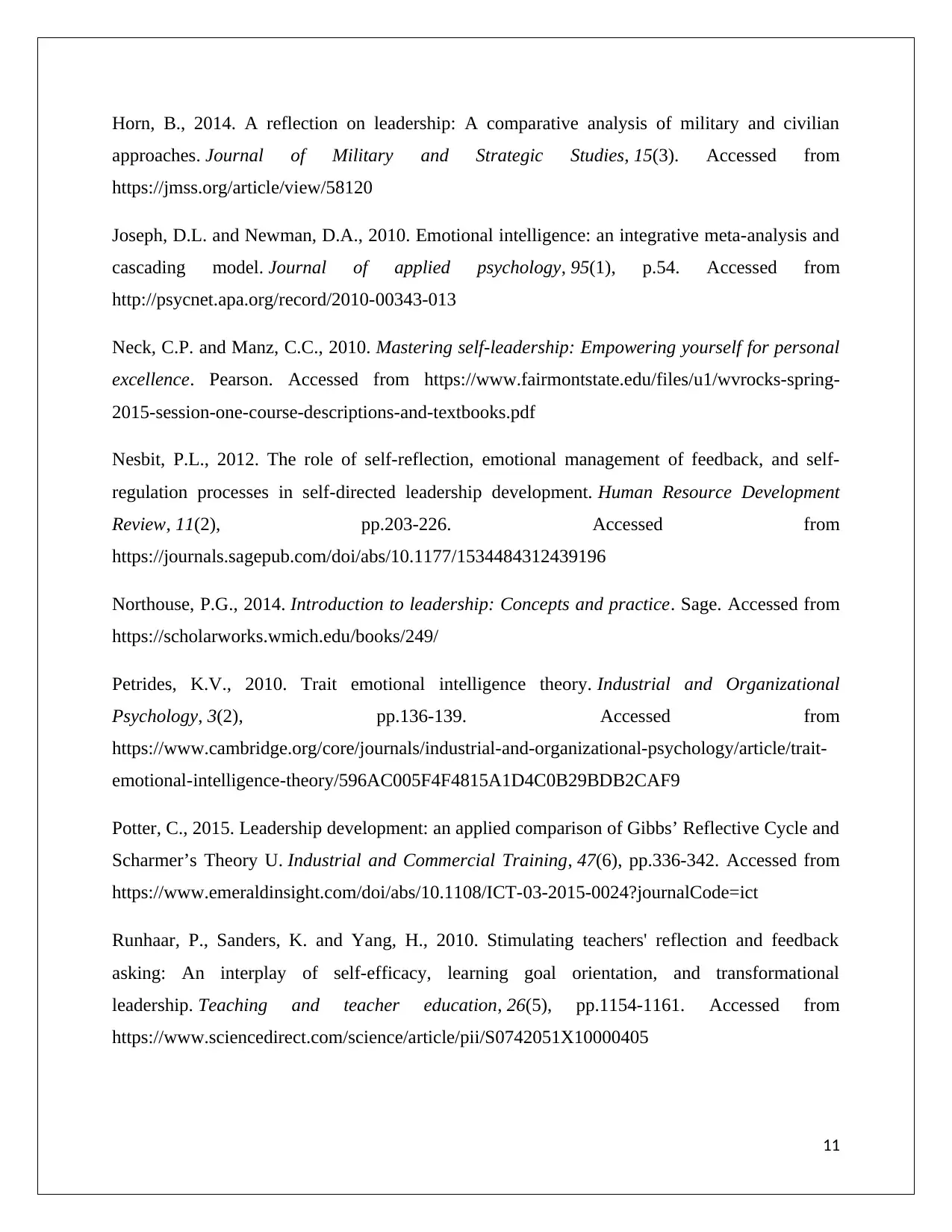
Horn, B., 2014. A reflection on leadership: A comparative analysis of military and civilian
approaches. Journal of Military and Strategic Studies, 15(3). Accessed from
https://jmss.org/article/view/58120
Joseph, D.L. and Newman, D.A., 2010. Emotional intelligence: an integrative meta-analysis and
cascading model. Journal of applied psychology, 95(1), p.54. Accessed from
http://psycnet.apa.org/record/2010-00343-013
Neck, C.P. and Manz, C.C., 2010. Mastering self-leadership: Empowering yourself for personal
excellence. Pearson. Accessed from https://www.fairmontstate.edu/files/u1/wvrocks-spring-
2015-session-one-course-descriptions-and-textbooks.pdf
Nesbit, P.L., 2012. The role of self-reflection, emotional management of feedback, and self-
regulation processes in self-directed leadership development. Human Resource Development
Review, 11(2), pp.203-226. Accessed from
https://journals.sagepub.com/doi/abs/10.1177/1534484312439196
Northouse, P.G., 2014. Introduction to leadership: Concepts and practice. Sage. Accessed from
https://scholarworks.wmich.edu/books/249/
Petrides, K.V., 2010. Trait emotional intelligence theory. Industrial and Organizational
Psychology, 3(2), pp.136-139. Accessed from
https://www.cambridge.org/core/journals/industrial-and-organizational-psychology/article/trait-
emotional-intelligence-theory/596AC005F4F4815A1D4C0B29BDB2CAF9
Potter, C., 2015. Leadership development: an applied comparison of Gibbs’ Reflective Cycle and
Scharmer’s Theory U. Industrial and Commercial Training, 47(6), pp.336-342. Accessed from
https://www.emeraldinsight.com/doi/abs/10.1108/ICT-03-2015-0024?journalCode=ict
Runhaar, P., Sanders, K. and Yang, H., 2010. Stimulating teachers' reflection and feedback
asking: An interplay of self-efficacy, learning goal orientation, and transformational
leadership. Teaching and teacher education, 26(5), pp.1154-1161. Accessed from
https://www.sciencedirect.com/science/article/pii/S0742051X10000405
11
approaches. Journal of Military and Strategic Studies, 15(3). Accessed from
https://jmss.org/article/view/58120
Joseph, D.L. and Newman, D.A., 2010. Emotional intelligence: an integrative meta-analysis and
cascading model. Journal of applied psychology, 95(1), p.54. Accessed from
http://psycnet.apa.org/record/2010-00343-013
Neck, C.P. and Manz, C.C., 2010. Mastering self-leadership: Empowering yourself for personal
excellence. Pearson. Accessed from https://www.fairmontstate.edu/files/u1/wvrocks-spring-
2015-session-one-course-descriptions-and-textbooks.pdf
Nesbit, P.L., 2012. The role of self-reflection, emotional management of feedback, and self-
regulation processes in self-directed leadership development. Human Resource Development
Review, 11(2), pp.203-226. Accessed from
https://journals.sagepub.com/doi/abs/10.1177/1534484312439196
Northouse, P.G., 2014. Introduction to leadership: Concepts and practice. Sage. Accessed from
https://scholarworks.wmich.edu/books/249/
Petrides, K.V., 2010. Trait emotional intelligence theory. Industrial and Organizational
Psychology, 3(2), pp.136-139. Accessed from
https://www.cambridge.org/core/journals/industrial-and-organizational-psychology/article/trait-
emotional-intelligence-theory/596AC005F4F4815A1D4C0B29BDB2CAF9
Potter, C., 2015. Leadership development: an applied comparison of Gibbs’ Reflective Cycle and
Scharmer’s Theory U. Industrial and Commercial Training, 47(6), pp.336-342. Accessed from
https://www.emeraldinsight.com/doi/abs/10.1108/ICT-03-2015-0024?journalCode=ict
Runhaar, P., Sanders, K. and Yang, H., 2010. Stimulating teachers' reflection and feedback
asking: An interplay of self-efficacy, learning goal orientation, and transformational
leadership. Teaching and teacher education, 26(5), pp.1154-1161. Accessed from
https://www.sciencedirect.com/science/article/pii/S0742051X10000405
11
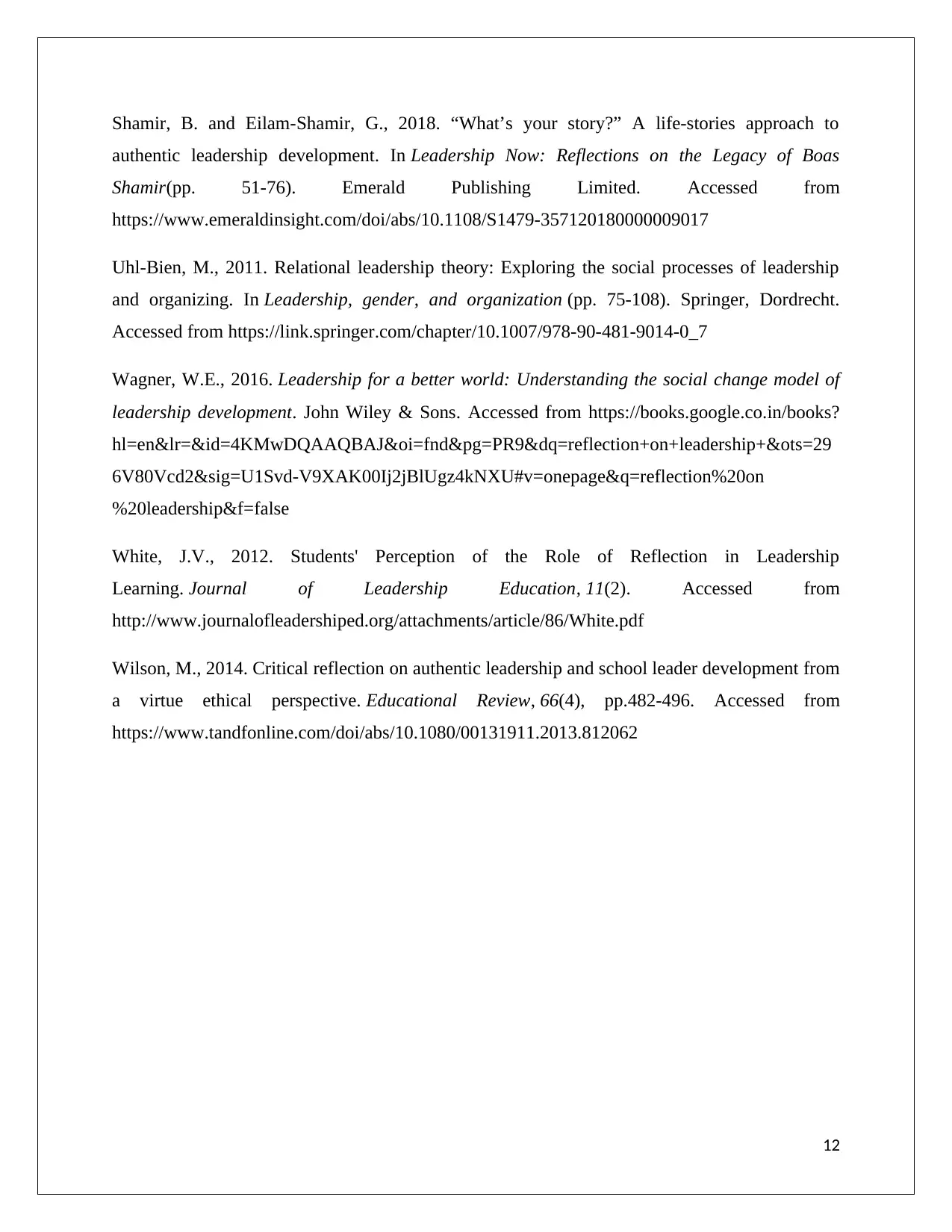
Shamir, B. and Eilam-Shamir, G., 2018. “What’s your story?” A life-stories approach to
authentic leadership development. In Leadership Now: Reflections on the Legacy of Boas
Shamir(pp. 51-76). Emerald Publishing Limited. Accessed from
https://www.emeraldinsight.com/doi/abs/10.1108/S1479-357120180000009017
Uhl-Bien, M., 2011. Relational leadership theory: Exploring the social processes of leadership
and organizing. In Leadership, gender, and organization (pp. 75-108). Springer, Dordrecht.
Accessed from https://link.springer.com/chapter/10.1007/978-90-481-9014-0_7
Wagner, W.E., 2016. Leadership for a better world: Understanding the social change model of
leadership development. John Wiley & Sons. Accessed from https://books.google.co.in/books?
hl=en&lr=&id=4KMwDQAAQBAJ&oi=fnd&pg=PR9&dq=reflection+on+leadership+&ots=29
6V80Vcd2&sig=U1Svd-V9XAK00Ij2jBlUgz4kNXU#v=onepage&q=reflection%20on
%20leadership&f=false
White, J.V., 2012. Students' Perception of the Role of Reflection in Leadership
Learning. Journal of Leadership Education, 11(2). Accessed from
http://www.journalofleadershiped.org/attachments/article/86/White.pdf
Wilson, M., 2014. Critical reflection on authentic leadership and school leader development from
a virtue ethical perspective. Educational Review, 66(4), pp.482-496. Accessed from
https://www.tandfonline.com/doi/abs/10.1080/00131911.2013.812062
12
authentic leadership development. In Leadership Now: Reflections on the Legacy of Boas
Shamir(pp. 51-76). Emerald Publishing Limited. Accessed from
https://www.emeraldinsight.com/doi/abs/10.1108/S1479-357120180000009017
Uhl-Bien, M., 2011. Relational leadership theory: Exploring the social processes of leadership
and organizing. In Leadership, gender, and organization (pp. 75-108). Springer, Dordrecht.
Accessed from https://link.springer.com/chapter/10.1007/978-90-481-9014-0_7
Wagner, W.E., 2016. Leadership for a better world: Understanding the social change model of
leadership development. John Wiley & Sons. Accessed from https://books.google.co.in/books?
hl=en&lr=&id=4KMwDQAAQBAJ&oi=fnd&pg=PR9&dq=reflection+on+leadership+&ots=29
6V80Vcd2&sig=U1Svd-V9XAK00Ij2jBlUgz4kNXU#v=onepage&q=reflection%20on
%20leadership&f=false
White, J.V., 2012. Students' Perception of the Role of Reflection in Leadership
Learning. Journal of Leadership Education, 11(2). Accessed from
http://www.journalofleadershiped.org/attachments/article/86/White.pdf
Wilson, M., 2014. Critical reflection on authentic leadership and school leader development from
a virtue ethical perspective. Educational Review, 66(4), pp.482-496. Accessed from
https://www.tandfonline.com/doi/abs/10.1080/00131911.2013.812062
12
⊘ This is a preview!⊘
Do you want full access?
Subscribe today to unlock all pages.

Trusted by 1+ million students worldwide
1 out of 16
Related Documents
Your All-in-One AI-Powered Toolkit for Academic Success.
+13062052269
info@desklib.com
Available 24*7 on WhatsApp / Email
![[object Object]](/_next/static/media/star-bottom.7253800d.svg)
Unlock your academic potential
Copyright © 2020–2026 A2Z Services. All Rights Reserved. Developed and managed by ZUCOL.





